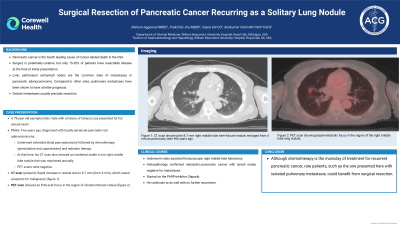Tuesday Poster Session
Category: Biliary/Pancreas
P2935 - Surgical Resection of Pancreatic Cancer Recurring as a Solitary Lung Nodule
Tuesday, October 24, 2023
10:30 AM - 4:00 PM PT
Location: Exhibit Hall

Has Audio
.jpg)
Nishant Aggarwal, MD
William Beaumont Hospital-Royal Oak
Royal Oak, MI
Presenting Author(s)
Nishant Aggarwal, MD1, Prekchha Jha, MBBS2, Inayat Gill, DO1, Atulkumar Patel, MD, FACG1
1William Beaumont Hospital-Royal Oak, Royal Oak, MI; 2Corewell Health, Royal Oak, MI
Introduction: Pancreatic cancer is the fourth leading cause of cancer-related death in the USA. Surgery is potentially curative, but only 15-20% of patients have resectable disease at the time of initial presentation. Distant metastases usually preclude resection. We present a patient with a history of pancreatic adenocarcinoma who, five years later, was found to have biopsy-confirmed isolated pulmonary metastasis treated with surgical resection.
Case Description/Methods: A 79-year-old asymptomatic male with a history of tobacco use presented for his annual exam. Five years prior, he was diagnosed with locally advanced pancreatic tail adenocarcinoma for which he underwent extended distal pancreatectomy followed by chemotherapy (gemcitabine and capecitabine) and radiation therapy. Further testing revealed BRCA1 gene mutation. At that time, his CT scan also showed an incidental stable 4 mm right middle lobe nodule that was monitored annually. PET scans were negative. His present CT scan demonstrated a rapid increase in nodule size to 8.7 mm, which raised suspicion for malignancy (figure 1A). PET scan showed an FDG-avid focus in the region of aforementioned nodule (figure 1B). He subsequently underwent video-assisted thoracoscopic right middle lobe lobectomy. Histopathology confirmed metastatic pancreatic cancer with lymph nodes negative for metastases. He was subsequently started on the PARP-inhibitor Olaparib. He continues to do well with no further recurrence.
Discussion: Liver, peritoneum and lymph nodes are the common sites of metastases in pancreatic adenocarcinoma. Compared to other sites, pulmonary metastases have been shown to have a better prognosis. There are no clear post-treatment surveillance guidelines and the majority of recurrences are not eligible for curative therapy. Although chemotherapy is the mainstay of treatment for recurrent pancreatic cancer, rare patients, such as the one presented here with isolated pulmonary metastasis, could benefit from surgical resection.

Disclosures:
Nishant Aggarwal, MD1, Prekchha Jha, MBBS2, Inayat Gill, DO1, Atulkumar Patel, MD, FACG1. P2935 - Surgical Resection of Pancreatic Cancer Recurring as a Solitary Lung Nodule, ACG 2023 Annual Scientific Meeting Abstracts. Vancouver, BC, Canada: American College of Gastroenterology.
1William Beaumont Hospital-Royal Oak, Royal Oak, MI; 2Corewell Health, Royal Oak, MI
Introduction: Pancreatic cancer is the fourth leading cause of cancer-related death in the USA. Surgery is potentially curative, but only 15-20% of patients have resectable disease at the time of initial presentation. Distant metastases usually preclude resection. We present a patient with a history of pancreatic adenocarcinoma who, five years later, was found to have biopsy-confirmed isolated pulmonary metastasis treated with surgical resection.
Case Description/Methods: A 79-year-old asymptomatic male with a history of tobacco use presented for his annual exam. Five years prior, he was diagnosed with locally advanced pancreatic tail adenocarcinoma for which he underwent extended distal pancreatectomy followed by chemotherapy (gemcitabine and capecitabine) and radiation therapy. Further testing revealed BRCA1 gene mutation. At that time, his CT scan also showed an incidental stable 4 mm right middle lobe nodule that was monitored annually. PET scans were negative. His present CT scan demonstrated a rapid increase in nodule size to 8.7 mm, which raised suspicion for malignancy (figure 1A). PET scan showed an FDG-avid focus in the region of aforementioned nodule (figure 1B). He subsequently underwent video-assisted thoracoscopic right middle lobe lobectomy. Histopathology confirmed metastatic pancreatic cancer with lymph nodes negative for metastases. He was subsequently started on the PARP-inhibitor Olaparib. He continues to do well with no further recurrence.
Discussion: Liver, peritoneum and lymph nodes are the common sites of metastases in pancreatic adenocarcinoma. Compared to other sites, pulmonary metastases have been shown to have a better prognosis. There are no clear post-treatment surveillance guidelines and the majority of recurrences are not eligible for curative therapy. Although chemotherapy is the mainstay of treatment for recurrent pancreatic cancer, rare patients, such as the one presented here with isolated pulmonary metastasis, could benefit from surgical resection.

Figure: Figure 1: (A) CT scan showing the 8.7 mm right middle lobe inter-fissure nodule, enlarged from 4 mm as previously seen, and (B) PET scan showing hypermetabolic focus in the region of the lung nodule.
Disclosures:
Nishant Aggarwal indicated no relevant financial relationships.
Prekchha Jha indicated no relevant financial relationships.
Inayat Gill indicated no relevant financial relationships.
Atulkumar Patel indicated no relevant financial relationships.
Nishant Aggarwal, MD1, Prekchha Jha, MBBS2, Inayat Gill, DO1, Atulkumar Patel, MD, FACG1. P2935 - Surgical Resection of Pancreatic Cancer Recurring as a Solitary Lung Nodule, ACG 2023 Annual Scientific Meeting Abstracts. Vancouver, BC, Canada: American College of Gastroenterology.
